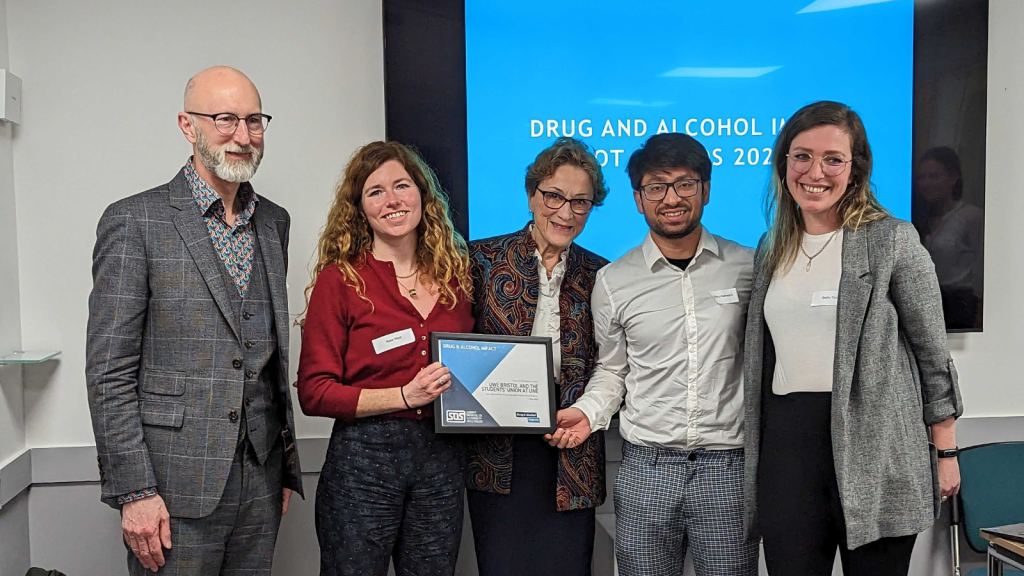Yesterday, The University of Leeds, Keele University and the University of West England, alongside their respective students’ unions, were recognised for their harm reduction approach to student drug and alcohol use at an event hosted by Universities UK.
Following a six-month sector-wide consultation, SOS-UK launched Drug and Alcohol Impact in 2020, and this event marked the end of the two-year pilot. The accreditation programme supports universities and students’ unions to move to a harm reduction approach to drugs which firmly prioritises the support and safety of students and a shift away from historical zero-tolerance.
Through the two-year programme, the universities and students’ unions;
- Researched drug and alcohol use at their institution.
- Developed drug and alcohol policies orientated towards harm reduction and student support.
- Improved the provision of support for students, e.g. the UWE Bristol Wellbeing Service introduced an in-house Senior Drug and Alcohol Practitioner. This role supports students using drugs and alcohol and consults with and trains members of staff across the university. Keele University also developed a peer-led support scheme, providing a listening ear for students who need someone to talk to about their drug or alcohol issues and can signpost to specialist support services.
- Provided harm reduction advice, e.g. UWE Bristol and The Students’ Union at UWE worked together to build a new module for new and returning students. This module included information on alcohol consumption, social norms and drugs. The message is framed as being kind to each other in the community and staying safe and healthy.
- Set up training for relevant staff and student roles; for example, Leeds University Union now trains Wellbeing Event Reps on identifying students needing help due to drug use, the support available, and how to engage in conversations about their drug use.
- Redeveloped disciplinary procedures to increase support for students.
The event was attended by higher education sector bodies, politicians, and health professionals to discuss the programme’s findings and how the higher education sector can join forces in an approach that reduces the harm from drugs and alcohol in the student population.
Thank you to John de Pury (Assistant Director of Policy, Universities UK), Nic Beech (Vice Chancellor of Middlesex University and Chair of the UUK task force), Dame Carol Black (Author of the Independent Review of Drugs) and Dan Carden (Labour MP for Liverpool Walton) for your remarks at the event and your support for the programme.
We would also like to offer a huge congratulations to the following universities and their students’ union’s whom all achieved Drug and Alcohol Impact accreditation. These three universities and their students’ unions are doing incredible work around drug and alcohol harm reduction.
- UWE Bristol and the Students’ Union at UWE
- The University of Leeds and Leeds University Union
- Keele University and Keele University Students’ Union
Tracy Lumb, Senior Project Manager – Wellbeing at SOS-UK, said
“Historically, UK university campuses have taken a zero-tolerance approach to student drug use. Addressing drug use in a purely punitive manner has closed down discussions and education that would provide students with another possible access point for support. Students should have the information and tools to make informed decisions about their health. 40% of students1[i]said they would not feel confident disclosing information about their drug use to their college without fear of punishment. With a decline in student mental health and well-evidenced links between mental health and substance use, zero-tolerance policies are preventing students experiencing mental health problems from accessing support. As with other challenging topics, such as sexual- or gender-based violence, not talking about drug use has not made it go away. We congratulate these universities and students’ unions for taking a truly holistic approach to student wellbeing.”
Katie Laverty, Director of Student Support and Success Keele University, said:
“We are incredibly proud of the work undertaken by our teams in improving our approach to substance misuse. Participation in the Drug and Alcohol Impact pilot has helped to pave the way for innovative methods to improve information, advice and support for students at Keele University and we are honoured to be one of the early contributors to the project. Whilst we continue to advance our work in this area, we hope that by sharing our practice and experiences, we can inspire more organisations to develop their own approaches and solutions to support students and improve understanding on this important issue.”
The full write-up of the Drug and Alcohol Impact pilot can be found here.
We look forward to using the results from the pilot to continue to develop and progress the Drug and Alcohol Impact programme going forward.
If you are interested in finding out more about the Drug and Alcohol Impact programme, please get in touch with tracy.lumb@sos-uk.org
